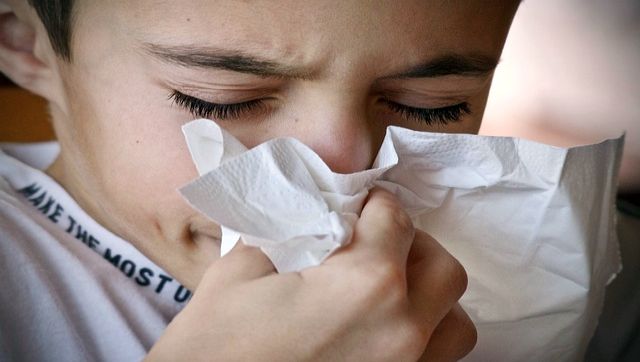At a time when China is seeing a dip in cases of the respiratory illness, dubbed white lung pneumonia, there’s a cough that’s making the United Kingdom sick, alarming medical experts. There’s a sudden rise in the number of people suffering from the ailment dubbed as 100-day cough in the UK and Wales. According to medical experts, there have been 716 reported cases of this ailment, also known as whooping cough, between July and November – three times higher than the same period in 2022. We take a closer look at what exactly is the 100-day cough, its symptoms, how dangerous can it be and what can be done to prevent or treat this sickness. What is the 100-day cough? Officially known as pertussis, the 100-day cough or whooping cough is caused when a bacteria called Bordetella pertussis enters the lungs and airways. In the past, it was a common childhood infection and cause of death among babies, but in 1950s a vaccine changed that. The 100-day cough can impact anyone, irrespective of age, gender or race. However, it is more commonly found among children below the age of five, or those too young to go through the immunisation programme. The disease causes violet coughing fits, which are often uncontrollable and make it tricky to breathe. In some rare cases, the intense coughing can also lead to vomiting. Doctors have stated that in the most extreme instances, the 100-day cough has also led to sore or fractured ribs.
Also read: US sees rise in ‘White Lung Syndrome’ cases: Is it linked to China’s pneumonia outbreak?
The UK National Health Service (NHS) says the name whooping cough is the result of the ‘whooping’ sound that arises after the bout of coughing. While 100-day cough is owing to the extent that it could affect a person. Globally, pertussis kills hundreds of thousands of children annually, according to the World Health Organisation (WHO). What are the symptoms of the 100-day cough? According to doctors, the first signs of contracting the 100-day are similar to a cold, such as a runny nose and sore throat. The NHS adds that symptoms usually appear seven to 10 days after the infection and includes a mild fever, sore throat and a cough that eventually turns into a hacking cough and then a whooping one. They add that the cough can be persistent, sometimes lasting for weeks or even months. Reports have also stated that the 100-day cough could cause middle ear infections as well as unintentional passing of urine. In some instances, it can also cause hernia. [caption id=“attachment_13490652” align=“alignnone” width=“640”] According to doctors, the first signs of contracting the 100-day are similar to a cold, such as a runny nose and sore throat. The NHS adds that symptoms usually appear seven to 10 days after the infection and includes a mild fever, sore throat and a cough. Image used for representational purposes/Pixabay[/caption] Why has there been a rise in cases of 100-day cough? While quite common in the past, the 100-day cough became rarer after a vaccine was introduced in the 1950s. However, there has been a sudden uptick in the number of cases in the UK and Wales; the South East being one of the hardest-hit areas in the UK within the last week – with 11 suspected cases. In total, as of date, there have been 716 occurrences of the 100-day cough between July and November this year. And according to medical experts that’s a 230 per cent jump in numbers from the previous year. But why the rise in cases then? Beate Kampmann, of the London School of Hygiene and Tropical Medicine had one explanation. She told The Sun, “The rise in cases might be because of missed vaccination appointments, possibly during the COVID-19 pandemic. “Severe disease is almost entirely preventable if the mother is vaccinated in pregnancy and her protective antibody reach the baby through the placenta and protect until the baby gets its own vaccines.” In fact, data provided by the UK Health Security Agency shows that maternal whooping cough vaccine programme has seen a drop – its lowest in seven years. In 2022, the average rate of vaccination in England was 61.5 per cent, a decrease of 3.9 per cent since 2021 and 7.6 per cent from 2020. Coverage in London is particularly low at just 41.4 per cent. Dr Gayatri Amirthalingam, a consultant epidemiologist at UK Health Security Agency, also noted that the pandemic and its resulting social distancing and lockdown policies could have been the reason behind the dip in numbers recently. Adam Finn, a professor of paediatrics at the University of Bristol, also concurred with this opinion. He told The Guardian that the restrictions meant fewer whooping cough infections and hence a smaller number of people with immunity. “And that means that when an infection comes, it gets more opportunities to spread,” he said. [caption id=“attachment_13490662” align=“alignnone” width=“640”]
According to doctors, the first signs of contracting the 100-day are similar to a cold, such as a runny nose and sore throat. The NHS adds that symptoms usually appear seven to 10 days after the infection and includes a mild fever, sore throat and a cough. Image used for representational purposes/Pixabay[/caption] Why has there been a rise in cases of 100-day cough? While quite common in the past, the 100-day cough became rarer after a vaccine was introduced in the 1950s. However, there has been a sudden uptick in the number of cases in the UK and Wales; the South East being one of the hardest-hit areas in the UK within the last week – with 11 suspected cases. In total, as of date, there have been 716 occurrences of the 100-day cough between July and November this year. And according to medical experts that’s a 230 per cent jump in numbers from the previous year. But why the rise in cases then? Beate Kampmann, of the London School of Hygiene and Tropical Medicine had one explanation. She told The Sun, “The rise in cases might be because of missed vaccination appointments, possibly during the COVID-19 pandemic. “Severe disease is almost entirely preventable if the mother is vaccinated in pregnancy and her protective antibody reach the baby through the placenta and protect until the baby gets its own vaccines.” In fact, data provided by the UK Health Security Agency shows that maternal whooping cough vaccine programme has seen a drop – its lowest in seven years. In 2022, the average rate of vaccination in England was 61.5 per cent, a decrease of 3.9 per cent since 2021 and 7.6 per cent from 2020. Coverage in London is particularly low at just 41.4 per cent. Dr Gayatri Amirthalingam, a consultant epidemiologist at UK Health Security Agency, also noted that the pandemic and its resulting social distancing and lockdown policies could have been the reason behind the dip in numbers recently. Adam Finn, a professor of paediatrics at the University of Bristol, also concurred with this opinion. He told The Guardian that the restrictions meant fewer whooping cough infections and hence a smaller number of people with immunity. “And that means that when an infection comes, it gets more opportunities to spread,” he said. [caption id=“attachment_13490662” align=“alignnone” width=“640”] The simplest way to prevent the 100-day cough, or whooping cough, is to get vaccinated. Pregnant women should take the vaccination and also ensure that their child takes the vaccination. Image used for representational purposes/Pixabay[/caption] How to prevent or treat the 100-day cough? The simplest way to prevent the 100-day cough, or whooping cough, is to get vaccinated. Pregnant women should take the vaccination and also ensure that their child takes the vaccination. The vaccination for whooping cough is administered at eight, 12 and 16 weeks, and as part of a four-in-one booster to preschool children aged three years and four months. Doctors have noted that if one contracts the 100-day cough, they should consult a doctor as well as make a few lifestyle changes. For example, using a humidifier at the time of the sickness could help in easing the breathing process. Also, rest and an increase in liquid intake are recommended at this point. Paracetamol or ibuprofen can be taken. However, in very severe cases hospital treatment may be required. The NHS adds that if whooping cough is diagnosed within three weeks of the infection, antibiotics can be given to help prevent others becoming infected. With inputs from agencies
The simplest way to prevent the 100-day cough, or whooping cough, is to get vaccinated. Pregnant women should take the vaccination and also ensure that their child takes the vaccination. Image used for representational purposes/Pixabay[/caption] How to prevent or treat the 100-day cough? The simplest way to prevent the 100-day cough, or whooping cough, is to get vaccinated. Pregnant women should take the vaccination and also ensure that their child takes the vaccination. The vaccination for whooping cough is administered at eight, 12 and 16 weeks, and as part of a four-in-one booster to preschool children aged three years and four months. Doctors have noted that if one contracts the 100-day cough, they should consult a doctor as well as make a few lifestyle changes. For example, using a humidifier at the time of the sickness could help in easing the breathing process. Also, rest and an increase in liquid intake are recommended at this point. Paracetamol or ibuprofen can be taken. However, in very severe cases hospital treatment may be required. The NHS adds that if whooping cough is diagnosed within three weeks of the infection, antibiotics can be given to help prevent others becoming infected. With inputs from agencies
UK sees a 230% jump in 100-day cough cases: What is this ailment that can lead to fractured ribs?
FP Explainers
• December 11, 2023, 17:15:37 IST
Between July and November, the UK has seen 716 cases of the 100-day cough. Also known as whooping cough, this ailment causes difficulty in breathing and can lead to hernia and even sore or fractured ribs. Doctors have attributed the surge in caseload to the pandemic and resulting restrictions
Advertisement
)
End of Article